Table of Contents
Luxury Vinyl vs Tile Flooring: Pros, Cons, and Aesthetics
Choosing the right flooring is one of those decisions that sticks literally and financially. Two of the most talked-about options right now? Luxury vinyl plank flooring vs tile flooring.
They both check the boxes for durability and design, but they don’t behave the same once they’re in your home. Some people want comfort underfoot. Others care more about long-term value or moisture protection.
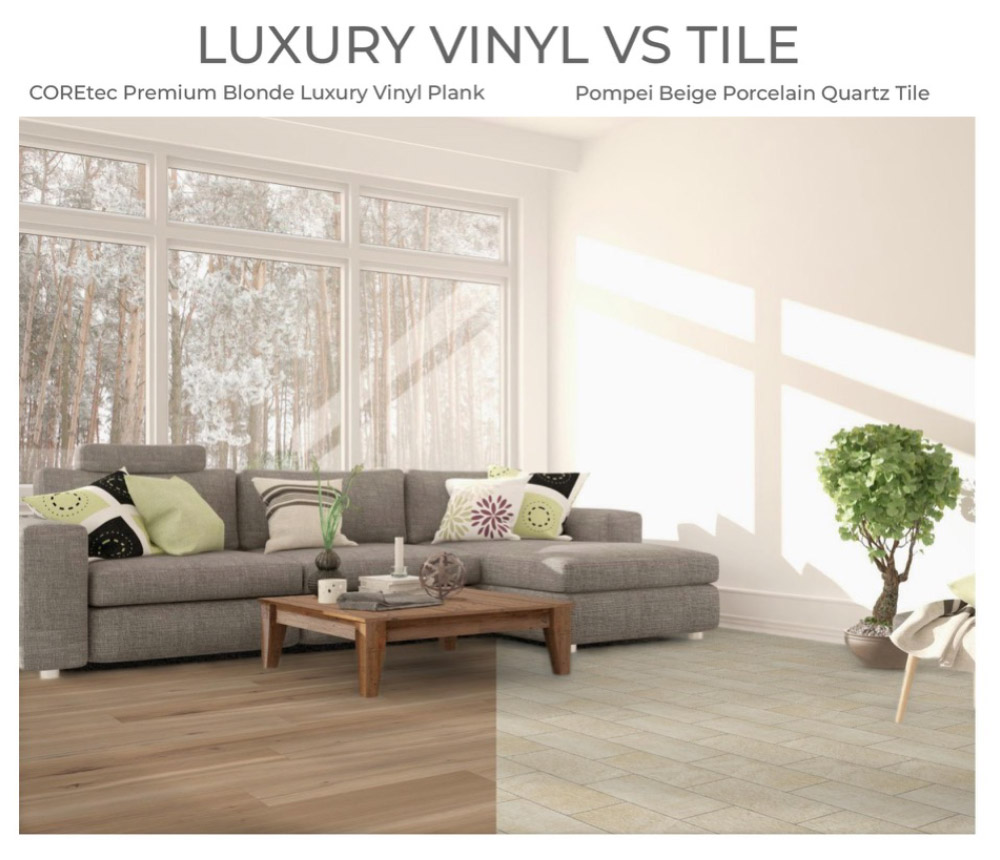
In this article, we’ll break down how vinyl flooring vs tile compares in real homes, from installation and cost to daily comfort and long-term performance. Whether you're updating a bathroom, redoing the kitchen, or planning a full-home remodel, understanding the differences between these two flooring materials can help you make the call with confidence.
Let’s take a closer look at how tile and vinyl flooring really stack up.
What is Luxury Vinyl Plank Flooring?
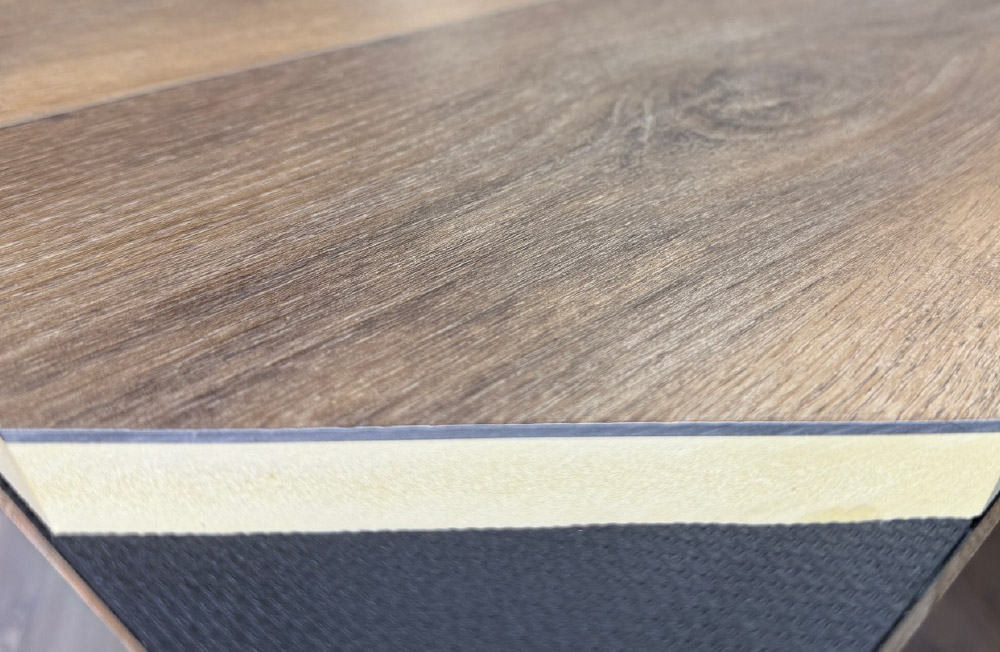
Luxury vinyl plank flooring, or LVP, is a modern flooring material designed to look like real hardwood or stone but without the high cost or maintenance.
Each plank is made up of several layers. There’s a durable top wear layer to resist scratches, a printed design layer that mimics wood grain or stone texture, and a rigid or flexible core for support. Some even include a backing layer for extra comfort and sound reduction.
One reason homeowners choose vinyl flooring is the look. High-quality options can closely resemble oak, hickory, marble, or slate. You get that natural look without the upkeep or risk of damage from water.
It’s also built for everyday life. Many types of vinyl plank flooring are pet-friendly flooring choices, resist spills, and stand up to the wear of busy households.
Pros and Cons of Luxury Vinyl Plank Flooring

Pros
- Water-resistant: LVP holds up well in areas with frequent moisture, like kitchens, bathrooms, and basements. It helps prevent water damage without needing special treatments.
- Comfortable: Vinyl plank feels softer and warmer than tile, making it more comfortable for standing and walking, especially in colder climates.
- Easy installation: Most products use a click-lock or peel-and-stick system, so you can install it quickly without hiring a pro.
- Affordable: It offers the look of natural wood or stone at a much lower cost, both in materials and installation.
- Low maintenance: No special cleaners or sealing required just regular sweeping and the occasional mop.
- Design variety: You can choose from a wide range of styles, including realistic wood- and stone-look options, to match nearly any interior.
Cons
- Less durable: Though durable overall, vinyl can scratch or dent from heavy furniture or sharp objects more easily than tile.
- Can fade: Sunlight over time may cause discoloration, especially in rooms with large windows.
- Seam issues: If installed incorrectly, moisture can seep into the seams and cause damage underneath.
What is Tile Flooring?
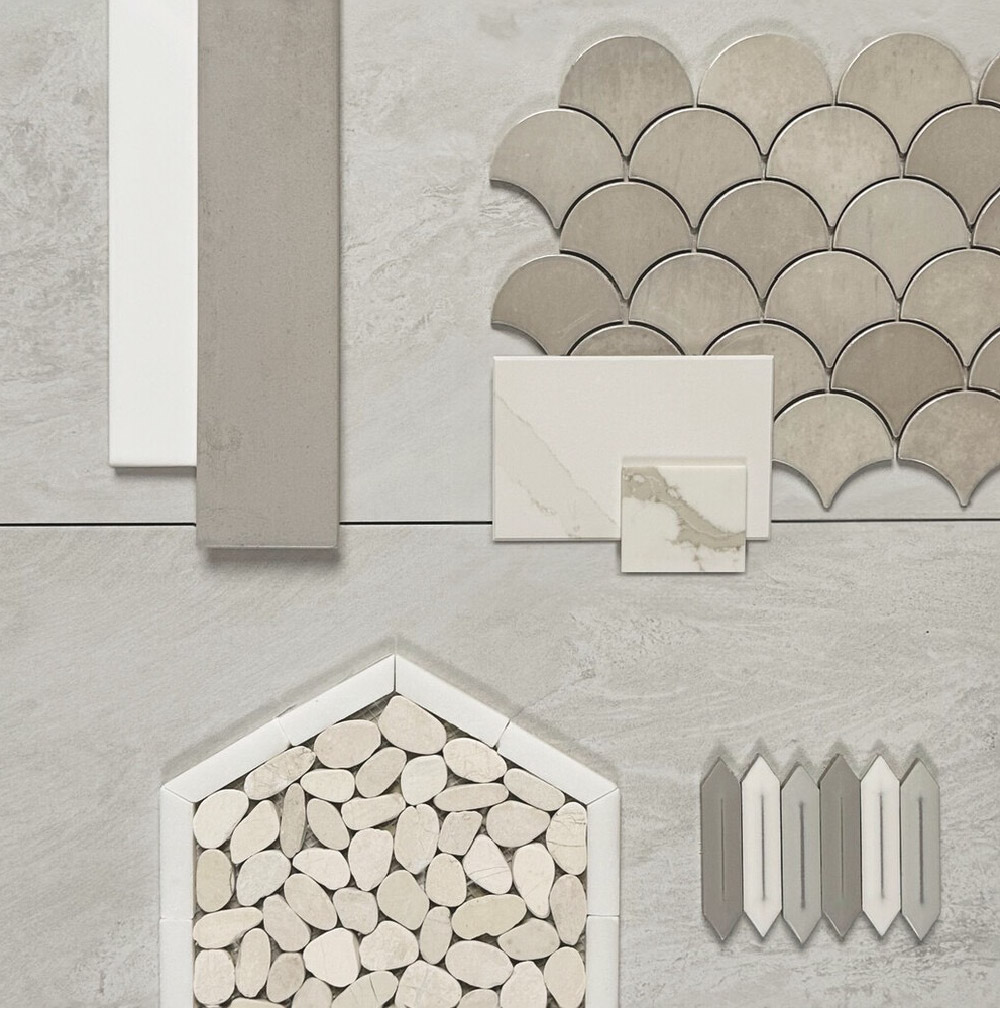
Tile flooring is a hard-surface flooring material typically made from ceramic, porcelain, or natural stone. It’s one of the most durable options you can install and has been used in homes for decades.
Ceramic tile is made from natural clay and fired at high temperatures. It’s affordable, versatile, and available in countless styles. Porcelain tile is denser and more water-resistant, making it a strong choice for bathrooms, kitchens, and entryways. Stone tile options like slate or travertine bring a more rustic, natural look.
Tile is known for its strength, water resistance, and long lifespan. Whether you want something sleek and modern or earthy and textured, tile flooring offers a wide range of design options to match your space.
Pros and Cons of Tile Flooring
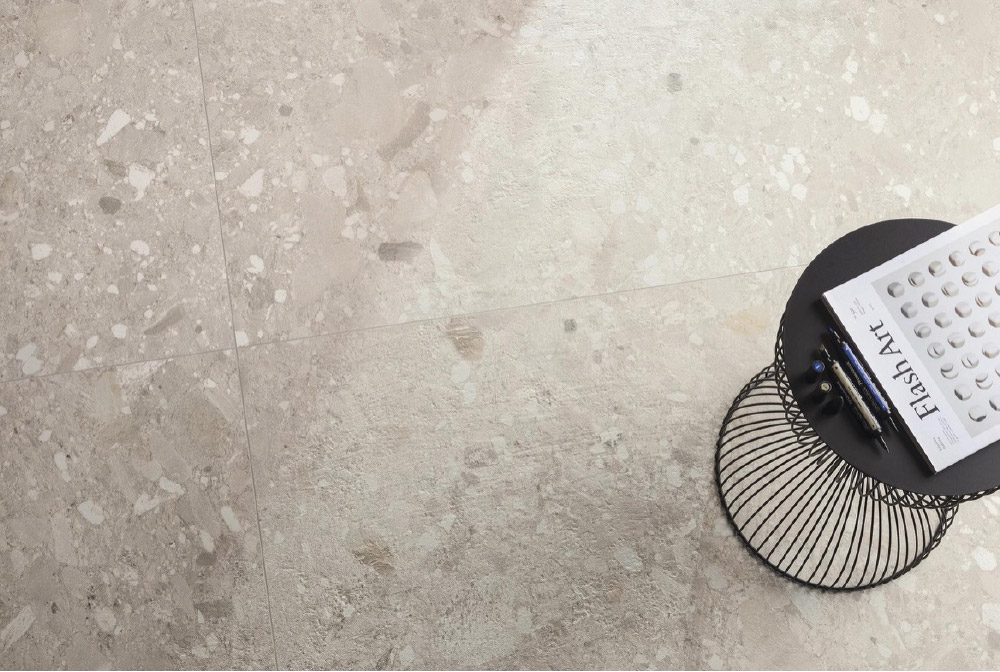
Pros
- Extremely durable: Tile is tough and built to last, especially in high-traffic areas like entryways and kitchens.
- Water-resistant: Porcelain and ceramic tile are naturally resistant to water, making them perfect for bathrooms and laundry rooms.
- Stain-resistant: Tile doesn’t absorb liquids easily, so spills and messes clean up quickly without leaving marks.
- Low maintenance: A simple sweep and mop routine keeps tile looking new with little effort.
- Design options: From sleek modern looks to rustic stone textures, tile comes in styles to suit almost any space.
- Good for resale: Tile flooring is often seen as a high-end upgrade and can boost a home’s value.
Cons
- Hard and cold: Tile can be uncomfortable to stand on for long periods and tends to feel chilly underfoot.
- Higher installation cost: Tile installation takes time, materials, and professional labor, which can raise overall costs.
- Cracking risk: Tile is strong but brittle, a dropped object can crack a tile, and repairs usually mean replacing the damaged piece.
- Grout upkeep: Grout lines can stain, wear out, or crack, and they need sealing or occasional touch-ups to stay clean.
Which Flooring Option Is Right for You?
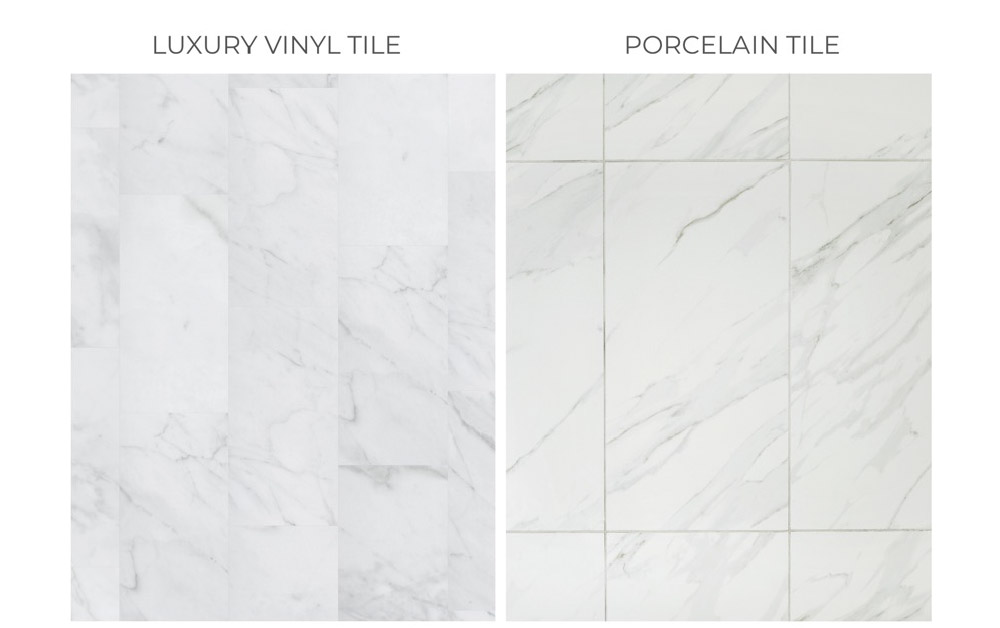
Choosing between luxury vinyl flooring vs tile depends on where you're installing it and how you use the space.
If you’re looking for something soft underfoot, easy to install, and budget-friendly, luxury vinyl plank flooring might be your best bet. It’s great for bedrooms, basements, and any area where comfort matters.
If durability and long-term value are your priority, tile flooring is the stronger option. It's especially ideal for high-traffic areas like entryways or for moisture-heavy spaces like bathrooms.
The type of flooring you choose also depends on your timeline and skill level. Vinyl flooring is generally easier and faster to install, while tile requires more time and often a professional.
In the end, the right flooring is the one that fits your space, lifestyle, and budget without sacrificing the look or feel you want.
Luxury Vinyl vs Tile Flooring Side-by-side Comparison
Here’s a quick side-by-side to help you compare the two flooring options at a glance:
| Feature | Luxury Vinyl Plank Flooring | Tile Flooring (Ceramic or Porcelain) |
|---|---|---|
| Comfort | Softer and warmer underfoot | Hard and cool surface |
| Installation | DIY-friendly, quick setup | More complex, often needs a pro |
| Cost | Lower material and labor cost | Higher overall installation cost |
| Durability | Holds up well, may dent or fade | Highly durable, long-lasting |
| Water Resistance | Waterproof surface, vulnerable at seams | Excellent water resistance when sealed |
| Style Options | Mimics wood, stone, tile textures | Wide range of natural and modern styles |
| Maintenance | Easy to clean, low effort | Requires grout upkeep |
| Resale Appeal | Growing in popularity | Seen as a premium feature in most homes |
| Sustainability | Synthetic materials, limited recyclability | Natural materials, longer lifespan |
Both vinyl plank flooring and tile flooring have clear benefits. Your decision comes down to what matters most in your space, comfort, cost, durability, or design.
Making the Final Decision
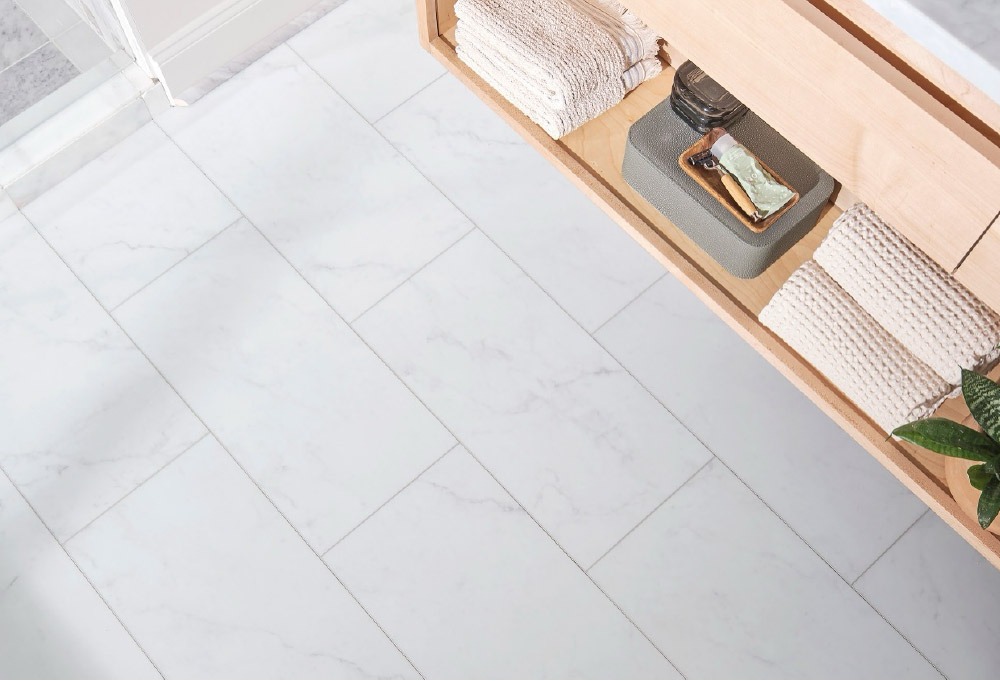
Luxury Vinyl vs Tile Flooring is a decision that depends on what matters most in your home. If comfort, easy installation, and affordability are your priorities, luxury vinyl plank flooring is a smart, stylish choice. It’s especially useful in rooms where you want the look of wood without the maintenance.
If long-term durability and added home value are what you’re after, tile flooring is a timeless option that can handle heavy use and resist moisture with ease.
In the end, the right flooring comes down to your lifestyle, space, and budget. Whether you prefer the softness of vinyl or the strength of tile, both can offer long-lasting performance and a look you’ll love for years.
Still deciding? The easiest next step is to see the styles in person. Touch the texture. Compare the colors. It’s often the small details that help the decision click into place.
Explore a wide range of vinyl and tile flooring options at Carpet Exchange and talk with a flooring expert who can help match your style, budget, and space.
Frequently Asked Questions
What are the pros and cons of luxury vinyl plank flooring?
Luxury vinyl plank flooring is water-resistant, affordable, and comfortable underfoot. It’s easy to install and doesn’t require much maintenance. On the flip side, it’s not as tough as ceramic tile, can dent under heavy furniture, and may fade over time if exposed to direct sunlight.
Is tile better than vinyl for bathrooms?
Both materials work well in bathrooms, but for pure moisture protection, tile flooring has the edge. Porcelain and ceramic tile are naturally water-resistant and can handle standing water without damage. Vinyl flooring also performs well but needs proper installation to keep moisture from getting under the planks.
Can luxury vinyl planks increase home value?
In many cases, yes — especially when it’s used in practical spaces like basements, laundry rooms, or kitchens. High-quality vinyl plank can mimic the look of hardwood or stone tile, making it an attractive upgrade. However, tile flooring is still seen as a more premium option in high-end real estate.
Does vinyl plank flooring hold up against pets?
Yes, vinyl plank flooring is a solid choice for pet owners. It’s resistant to scratches, easy to clean, and more forgiving under paws than hard tile. Look for rigid core vinyl or premium vinyl options for added durability if you have large or active pets.
